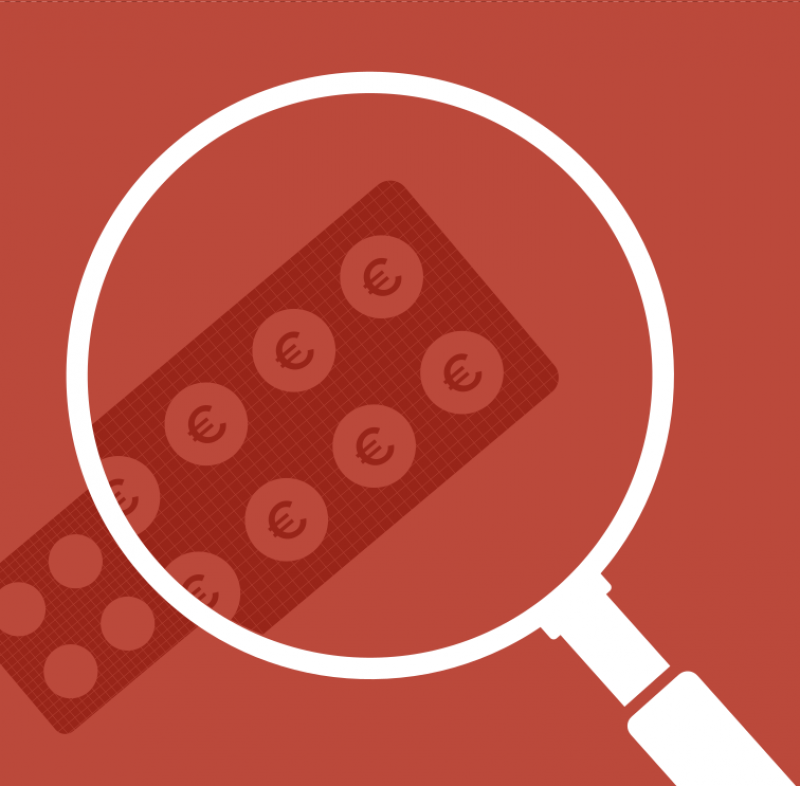
More Private than Public
The ways Big Pharma dominates the Innovative Medicines Initiative
This report asks whether the IMI’s health research truly delivers tangible benefits for citizens, such as better access to health innovations, or whether it is rather focused on enhancing the competitiveness of the largest pharmaceutical corporations.
(Following an exchange of letters with IMI, a new version of the report was uploaded on July 10 with a new subtitle for the Ebola section)
Introduction
The European Union’s Research and Innovation policy (R&I) is one of the key areas that can help us deliver both a better future for EU citizens and meet our international commitments, especially the UN’s Sustainable Development Goals. R&I is integral to addressing the many challenges faced by society, whether in health and wellbeing, food and farming systems, climate change, energy, or democracy and digitalization.
The European Commission sees the R&I policy as a core tool to “help create growth and jobs and tackle our biggest societal challenges”. To help achieve these policy objectives, the Commission, among others, has established partnerships with the private sector to pool “Europe’s resources to tackle the biggest challenges, support competitiveness, deliver high quality jobs, and encourage greater private investment in research and innovation.”
One of those partnerships, the Innovative Medicines Initiative (IMI), is a large-scale public-private partnership between the European Commission and pharmaceutical trade association and lobby group EFPIA (European Federation of Pharmaceutical Industries and Associations). The first partnership, IMI, ran from 2008-2013, and was renewed as IMI2 to run from 2014-2020. IMI is up for renewal again in 2020, with plans to shift its focus to digital health.
While its stated aim is to drive innovation in pharmaceutical research in the EU and improve health, IMI has been criticised as embodying a model by which the public sector foots a large part of the bill for research, while the private sector is able to set the research agenda in its own interests, and reap the rewards.
The EU’s policies ought to be shaped to achieve direct and tangible benefits for citizens and society, including equitable access to healthcare both within Europe and globally. In the case of the IMI, this means ensuring the agenda is needs-driven, rather than set by commercial interests.
As such, this report critically examines any structural weighting of IMI towards private sector interests. For example, we examine whether the IMI is setting research priorities for pharmaceutical innovation that may be more about business-as-usual market priorities, than about compensating for ‘market failures’ (the latter is a key rationale for such a public private partnership). We investigate, in particular, what value IMI adds, and whether its set priorities are really addressing public health needs such as HIV/AIDS and poverty-related and neglected tropical diseases.
We examine whether the IMI delivers – on its own stated terms – of increasing competitiveness in the European’s pharmaceutical sector, given some of the misgivings of project partners such as small and medium enterprises. The report looks at concerns over whether public, non-profit, and smaller partners have equal access to data produced in IMI projects, or whether the influence of the private pharmaceutical sector is placing undue limits on intellectual property.
The question of whether the IMI awards the private industry unwarranted influence in the formation of regulations for the health sector – such as medicines safety, or privacy of patients’ data – is also crucial. And it is equally important to assess whether an imbalance towards industry is reflected in the IMI’s governance, finance, andaccountability structures.
Overall, this report asks whether the IMI’s health research truly delivers tangible benefits for citizens, such as better access to health innovations, or whether it is rather focused on enhancing the competitiveness of the largest pharmaceutical corporations?
Both Horizon 2020, the current R&I framework programme, as well as IMI2, end in 2020. At the time of writing, the European institutions are in the process of designing Horizon Europe to succeed Horizon 2020, as well as the successor of IMI2 to be called “Innovative Health Initiative”.3 It is an important moment, then, to investigate the societal impact of IMI, particularly in terms of public health goals, in order to meaningfully feed into the discussions and the processes around the future of the programme. The future shape of IMI’s successor is of interest to all European citizens, and especially given the large sums of taxpayers’ money to be spent on such a research framework, we believe this should be a topic of wider public discussion.
The methodology of the report has included desk and literature review and interviews, and Freedom of Information requests to the European Commission. We have compared the IMI’s research areas to those identified by the World Health Organisation as priority areas for medicine and interviewed former participants in IMI projects. We have examined the governance structure, accountability, and evaluation processes of IMI. This was an attempt to assess both whether IMI delivers positive societal impacts, and to understand whether its stated claims of enhancing EU competitiveness stand up to scrutiny. Furthermore, we made a critical assessment of what governance and accountability mechanisms were in place to ensure that public money spent through IMI focuses in areas where there was a clear and real need for public funding. Billions have been spent on IMI to date, and it is likely that billions will be invested in the next partnership. It is therefore critical to analyse whether IMI is truly equipped to achieve its own stated aims and deliver benefits for society.
The report aims to answer to these and other questions that arose as we carried out our investigation into IMI.
